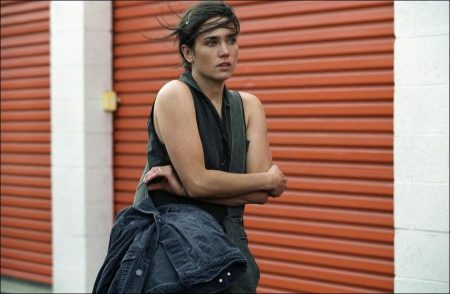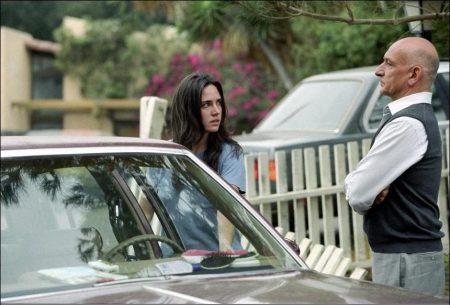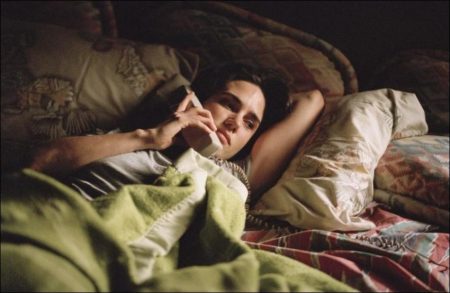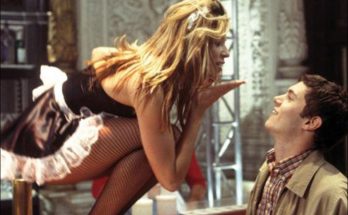Taglines: Some dreams can’t be shared.
Based on the acclaimed bestseller by Andre Dubus III. Massoud Amir Behrani (Ben Kingsley) is living a lie to fulfill a dream. Once a member of the Shah of Iran’s elite inner circle, he has brought his family to America to build a new life. Despite a pretense of continued affluence, he is barely making ends meet until he sees his opportunity in the auction of a house being sold for back taxes. It is a terrible mistake.
Through a bureaucratic snafu, the house had been improperly seized from its rightful owner, Kathy Lazaro (Jennifer Connelly). The loss of her home tears away Kathy’s last hope of a stable life?a life that had been nearly destroyed by addiction and Kathy decides to fight to recover her home at any cost. Academy Award winners Jennifer Connelly (A Beautiful Mind) and Ben Kingsley (Gandhi) star in the dramatic thriller “House of Sand and Fog,” based on the acclaimed bestseller by Andre Dubus.
A gripping exploration of the American Dream gone awry, “House of Sand and Fog” is the story of two people driven to desperate measures to claim ownership of a house. It is only a small bungalow in Northern California, but to Kathy Nicolo (Jennifer Connelly), it is the last vestige of hope for reclaiming a life that was nearly lost to addiction. When a bureaucratic error forces her eviction, Kathy is left homeless — helpless to stop the house from being sold at auction for a fraction of its worth.
The new owner, Massoud Amir Behrani, sees the house as the fulfillment of the American Dream he has been pursuing since he fled Iran with his family years earlier. A former Colonel in the Iranian Air Force, Behrani has been reduced to working menial jobs to maintain a pretense of affluence. Now he pours the last of his life savings into the purchase of the house that will, at last, bring back the prosperity his family once knew.
As Kathy and Behrani’s fight for the house escalates, Kathy finds an unlikely ally in the officer sent to evict her, Deputy Sheriff Lester Burdon (Ron Eldard), who becomes dangerously devoted to her cause. Caught in the maelstrom are Behrani’s wife, Nadi (Shohreh Aghdashloo), and son, Esmail (Jonathan Ahdout).
What begins as a conflict over a small, rundown bungalow spirals into a clash of cultures that propels everyone involved towards an inescapable, and ultimately heartbreaking, climax. “House of Sand and Fog” exposes the unsettling truth that it is sometimes our hopes and not our hatreds that divide us. The film also stars Ron Eldard (Black Hawk Down), major Iranian film star Shohreh Aghdashloo, newcomer Jonathan Ahdout, and Frances Fisher (Titanic) as Kathy’s attorney who tries to help her reclaim her home.
House of Sand and Fog is a 2003 American drama film directed by Vadim Perelman. The screenplay by Perelman and Shawn Lawrence Otto is based on the novel of the same name by Andre Dubus III. The story concerns the battle between a young woman and an immigrant Iranian family over the ownership of a house in Northern California, which ultimately leads to the destruction of four lives. The film was nominated for three Academy Awards: Best Actor (Ben Kingsley), Best Supporting Actress (Shohreh Aghdashloo), and Best Original Score (James Horner).
The film began a limited release in the United States on December 19, 2003 and opened at #43, grossing $45,572 in its opening weekend. It eventually grossed $13,040,288 in North America and $3,902,507 in other territories for a worldwide total of $16,942,795. Its budget was $16.5 million.
Film Review for House of Sand and Fog
”House of Sand and Fog,” adapted from the novel by Andre Dubus III, is one of several recent movies that try to harvest the terror and grandeur of classical tragedy from the everyday sorrows of contemporary American life. In some ways, Vadim Perelman’s film, an impressively self-assured directing debut, is more rigorous, or at least more Greek, in its understanding of tragedy than either Clint Eastwood’s ”Mystic River” or Alejandro González Iñárritu’s ”21 Grams.”
Like Antigone, it is the story of two rights adding up to a monstrous wrong. There are no clear villains, no serendipitous, life-altering accidents, only the slow, inexorable escalation of hasty decisions and excusable lapses in judgment toward an unbearable final catastrophe.
The film’s antagonists — an exiled Iranian military officer named Massoud Behrani and a housecleaner named Kathy Nicolo, who is recovering from years of addiction and the breakup of her marriage — are both acting in defense of principles that seem unarguable. At issue between them is a modest piece of coastal California real estate — the house of the title — to which both seem to have an equally legitimate claim. Kathy (Jennifer Connelly), who inherited the house from her father, is evicted for failing to pay a county business tax mistakenly assessed against the property. Colonel Behrani (Ben Kingsley) buys the house at auction, hoping to restore his family’s fortune by selling it at a profit.
Though he thinks of himself as a fastidiously practical man, Behrani is motivated by much more than financial interest. He endures the humiliation of menial labor — working on a road-maintenance crew and behind the counter at a gas station convenience store — by clinging to the trappings of his former life, coming home from his jobs in tailored suits and a sleek Mercedes sedan. For him the house does not just represent an immigrant’s share in the American dream: taking possession of it is his way of refurbishing the dream of a vanished imperial Iran.
”House of Sand and Fog,” which opens today in New York and Los Angeles, is the nearly flawless execution of a deeply flawed premise. Mr. Perelman inadvertently exposes the inconsistencies in Mr. Dubus’s novel even as he comes very close to overcoming them. He eschews the fashionable techniques of provocation and shock, declining to rub our faces in raw misery with extreme close-ups, grainy cinematography and punched-up editing. The film, shot by Roger Deakins, has a somber, elegant look and a style that might best be described as tactful, as if some of the grace and formality of the Behrani household had rubbed off on the director.
That household, with its polished brass coffee table and overstuffed furniture, is the emotional and dramatic center of the movie. Mr. Kingsley is an actor of formidable reserve, and when he lets it go, you feel as if the world itself has broken open. The deepest pathos comes from the quietest performer, Shohreh Aghdashloo, who speaks very little (in Farsi and broken English) and whose eloquence resides in her weary, lovely face. Next to her poise and delicacy, Ms. Connelly seems a little blank, as if she were suppressing her smartness and agility to play a woman of greater passivity and lesser intelligence.
Behrani is a man accustomed to command, and he exercises a sometimes brutal tyranny over his wife (Ms. Aghashloo) and son (Jonathan Ahdout) to defend his beleaguered sense of patriarchal infallibility. His principal flaw, a furious reluctance to relinquish control, is perfectly — that is, fatally — symmetrical with Kathy’s inability to maintain control.
For Kathy, the house represents more than comfort and shelter — more, even, than a link with her scattered family and distant childhood. It is the only source of stability she has, and the loss of it is like the breaching of a fragile sea wall, unleashing a flood tide of bad luck and self-destructive behavior.
Her last lifeline is the kindness of Lester Burdon (Ron Eldard), a sheriff’s deputy who helped evict her from her house and decides to help her get it back. His motives are not entirely unselfish, and he seems to feed on Kathy’s self-destructiveness, offering himself up as a steadfast protector even as he nudges her off the wagon and willfully risks his marriage and career to be with her.
None of these three people are particularly likable, but they all seem worthy of sympathy, in part because they remain capable of showing it. Even as the conflict over the house escalates, Behrani, Lester and Kathy all hold on to compassion and decency, and even show signs of a willingness to relent. They seem to agree that no house is worth a human life, which makes the heavily foreshadowed final cataclysm especially painful and powerful.
And also, in the end, somewhat implausible. The conflict between Kathy and Behrani arises from a sin so trivial as to be almost comical: if Kathy had only opened her mail, the whole mess might have been avoided. And every stage of its escalation seems determined less by the psychology of the characters than by the forced, schematic logic of the story. You feel the heavy, implacable force of the narrative without quite believing it.
House of Sand and Fog (2003)
Directed by: Vadim Perelman
Starring: Ben Kingsley, Jennifer Connelly, Ron Eldard, Shohreh Aghdashloo, Kim Dickens, Carlos Gomez, Samira Damavandi, Navi Rawat, Namrata Singh Gujral
Screenplay by: Vadim Perelman
Production Design by: Maia Javan
Cinematography by: Roger Deakins
Film Editing by: Lisa Zeno Churgin
Costume Design by: Hala Bahmet
Set Decoration by: Gene Serdena
Art Direction by: Drew Boughton
Music by: James Horner
MPAA Rating: R for some violence / disturbing images, language and a scene of sexuality.
Distributed by: DreamWorks Pictures
Release Date: December 26, 2003
Visits: 163







